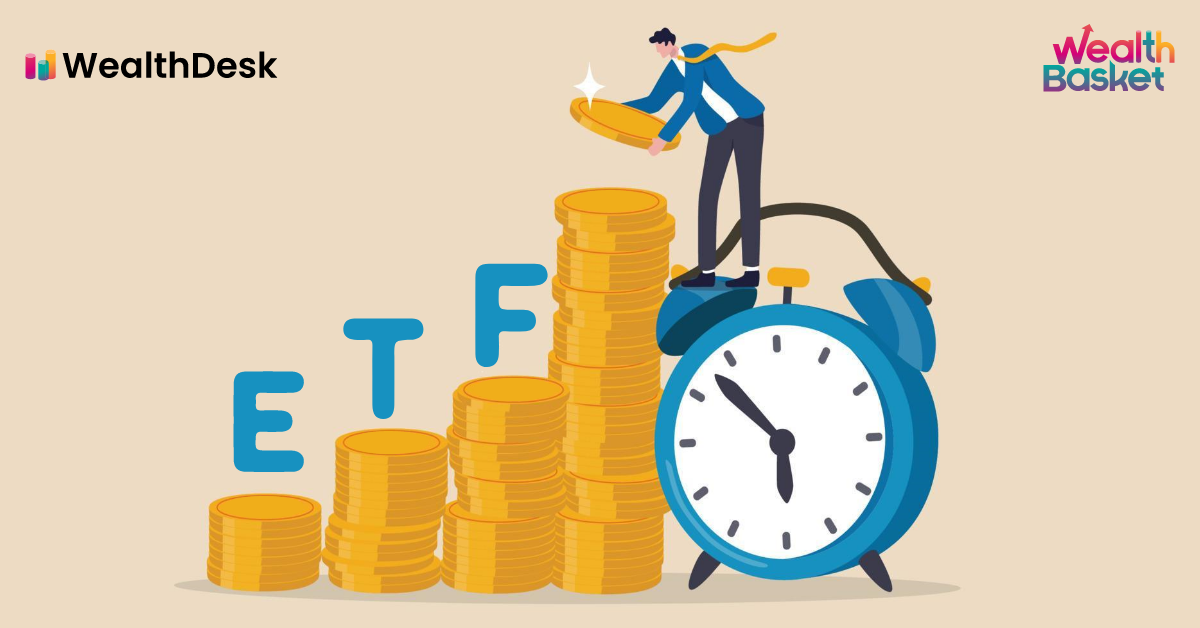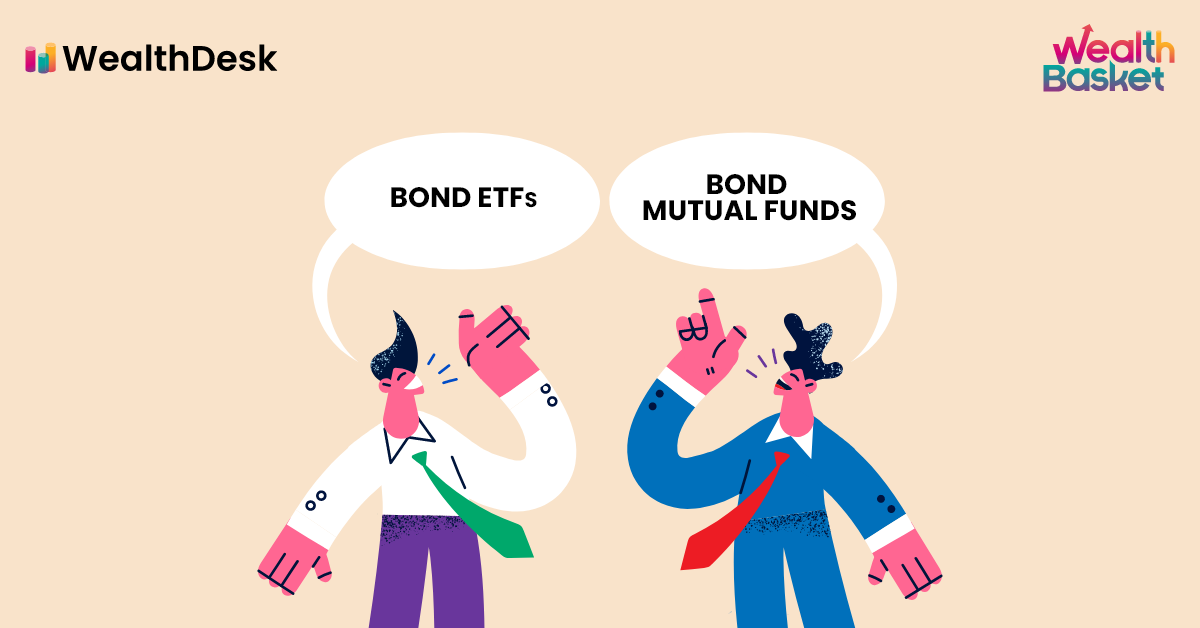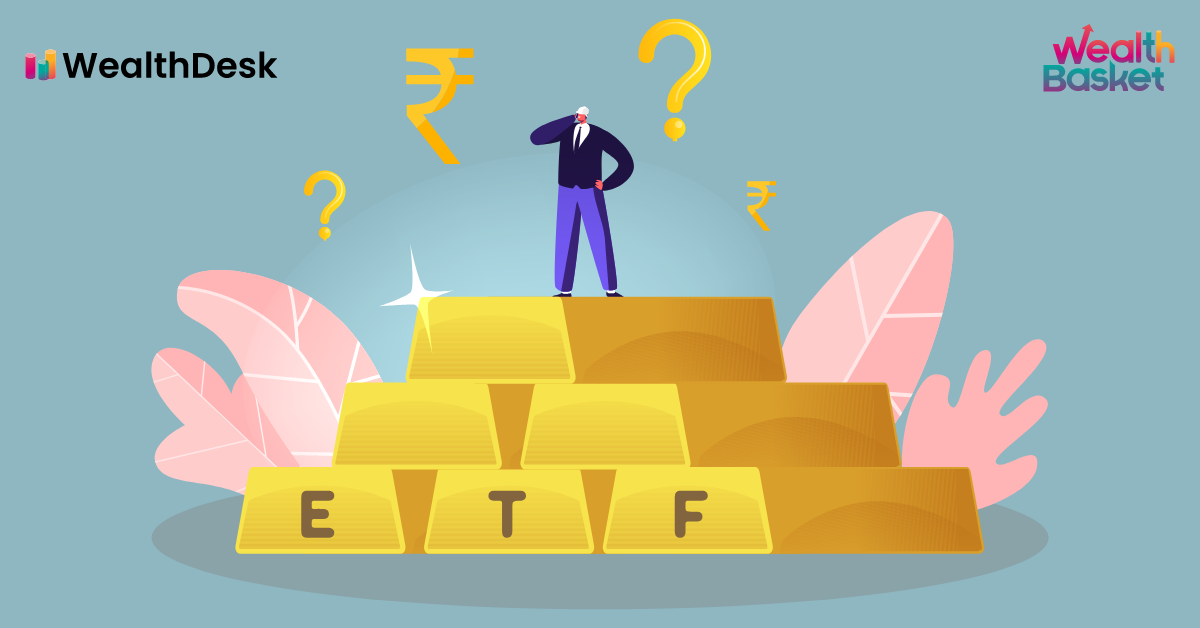A long-term investment strategy focuses on wealth creation rather than making short-term profits. When you invest your money intending to grow your wealth at a steady pace, you need to pick an investment instrument that diversifies your portfolio and helps you make long-term stable returns.
This article will help you understand how Exchange Traded Funds (ETFs) can help you achieve your long-term investment goals.
So, let’s get started.
What are ETFs?
ETFs are one of India’s most progressive and lucrative investment solutions at present. ETFs are collective investment funds that invest in various asset types, including Indian and international equities, commodities, and bonds. ETF units trade on a stock exchange in the same way that shares do. They are passive investments that track and duplicate a market index such as the BSE Sensex or the CNX Nifty.
How do ETFs Work?
ETFs track a particular index and try to duplicate the performance of that index. Different ETFs invest in different asset categories such as stocks, commodities, bonds, etc. Since they replicate the performance of an index it tracks, it is called passively managed funds.
For example, Reliance ETF Nifty BeES is a stock ETF that invests in all the stocks included in the Nifty 50 Index, and it tries to copy the performance of the stocks on the Nifty 50 Index. There may be some differences in the returns provided by the index and the returns generated by the ETF, it is called ‘tracking errors’.
You should pick an ETF that has fewer tracking errors because it indicates that the ETF is efficiently replicating the performance of the benchmark index.
Benefits of Long-Term Investing in ETFs
Investors can use ETFs to tap into various market indexes such as the Nifty, Sensex to potentially grow their wealth, and take it to the next level at a low cost.
No Active Fund Manager
The most intriguing aspect about ETFs is that they do not have active management to run the fund and instead rely on the market to pick which stocks to buy and sell. Since it is passively managed, they do not outperform an index. Instead, they just duplicate the performance of a benchmark index.
Convenient
Investing in ETFs is convenient because it allows you to buy and sell whenever you want. You can also use ETFs to perform intraday trades.
You don’t have to worry about redemptions with ETFs (as is the case with Mutual Funds) because market activity results in the transfer of units and does not affect the AUM. As a result, the tracking error of index ETFs may be smaller than that of index funds. Hence, they are a convenient investment alternative.
Budget-friendly
ETFs are passive funds that track indexes, gold, or bonds at a fraction of the cost of the underlying assets.
Because of their passive nature, ETFs have lower expense ratios than mutual funds. As the fund management costs reduce, it results in a lower expense ratio, incremental savings, and higher dividends in the long run.
ETF operating expenses are cheaper because funds are passively managed, while the service costs are close to nil because brokers handle client service. As a result, ETFs are cost-effective investments.
Real-time Trading
ETFs can be traded intraday and purchased and sold during market hours. ETFs are bought and traded during the day while the markets are open. During regular trading hours, the pricing of ETF shares is not constant. Prices change throughout the day, owing primarily to the fluctuating intraday value of the fund’s underlying assets.
Investors in ETFs know how much they paid for the units and how much they gained after selling them in seconds.
Liquidity
Like any other stock, you can exchange ETFs on the stock market exchange. Also, the added advantage is that you can trade them intraday, or buy and sell, unlike mutual funds that trade at the end of the day.
While index fund units are redeemed at a predetermined NAV price (at the end of the day), ETFs allow for intraday buying and selling on the exchange to take advantage of the prevailing price, which is near the scheme’s proper NAV at any time.
The benefit of intra-day trading is that you can sell or buy ETF units and redeem them according to your convenience. It thus allows you to convert your investments into cash, providing greater liquidity quickly.
Well-diversified
Diversification is another key benefit of investing in ETFs. One might potentially choose from a vast number of ETFs that differ primarily in terms of the underlying assets, such as gold, stock, or index funds.
ETFs allow you to spread investment risk across multiple securities and reduce stock-specific risk. Depending on the ETF types, you can obtain exposure to various equities, countries, industries, commodities, and so on in a single purchase.
Buy and Hold Ability
When a person holds stocks for an extended period, there is some risk associated. Because particular stocks’ business fundamentals may deteriorate over time, however, the business fundamentals of an index (say, the Bank Nifty) generally remain intact because an index must include only the most significant stocks.
Long Term ETF Performance
Returns data as on: 28-Mar-22
| Scheme Name | 1-Yr | 3-Yr | 5-Yr |
| DSP Equal Nifty 50 ETF | 24.11% | 15.45% | – |
| UTI Nifty Index ETF | 19.66% | 15.15% | 14.68% |
| HDFC Index (Nifty 50) ETF | 19.59% | 15.01% | 14.60% |
| SBI Nifty Index ETF | 19.57% | 14.85% | 14.42% |
| LIC MF Index (Nifty Plan)ETF | 19.39% | 14.80% | 14.09% |
| LIC MF Index (Sensex Plan)ETF | 18.16% | 15.04% | 14.90% |
| HDFC Index(Sensex Plan) ETF | 18.25% | 15.14% | 15.30% |
How to Create Long-Term ETF Investment Strategy
You can create a long-term ETF investment Strategy by following the steps below:
- Understand your investment goals, wealth creation targets, time horizon, risk appetite, and the amount of investment you would like to spare monthly, quarterly, or annually.
- Determine an asset mix and which assets’ ETFs (stocks, bonds, gold, sector ETFs) you would want to explore investing.
- Once your asset mix is ready, you just need to pick ETFs and create a basket of ETFs for your long-term investment strategy. Alternatively, you can simply select readymade WealthBaskets created carefully by the industry specialists approved by SEBI.
- Track your ETFs regularly to maintain your asset mix and add or remove any ETF.
Conclusion
ETFs make long-term wealth development easier because they provide flexibility, transparency, diversification, and the convenience of buying and selling on stock markets like any other stock. Investing in ETFs is not only suitable for first-time investors who are just starting on their financial journey, but it can also be an excellent long-term strategy for investors.
Discover stocks that suit certain filter criteria and dive into details to check their WealthBaskets.
At WealthDesk, we offer you a readymade WealthBasket consisting of stocks or ETFs reflecting an investment strategy or theme designed explicitly by the SEBI-approved investment professionals and make your investment journey hassle-free.
FAQs
An ETF is a good investment not just because it is passive and involves low-cost. Returns, how the index acts, how it helps diversify your assets, and the performance of index/equity fund alternatives are all critical considerations.
Because they are tax-efficient, ETFs can be
excellent long-term investments; however, not every
ETF is a viable long-term investment. For example,
inverse and leveraged ETFs are for a short
period. The greater an ETF’s passive and varied
characteristics, the better it is as a long-term
investment.
It depends on your investment goals and how long you want to stay invested in ETFs. While a long-term ETF holding for more than three years can get you better returns, short-term returns can also be more for some ETFs.


















